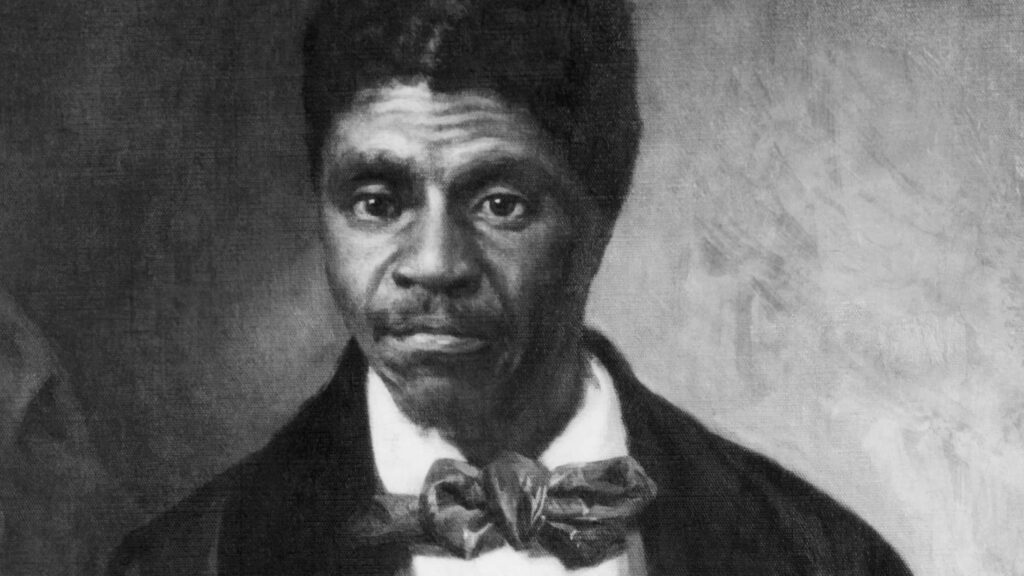How could one Supreme Court decision stress tensions to the point of war? The Dred Scott Decision of 1857 did exactly that, becoming a lightning rod for the fierce division between free and slave states.
In this landmark case, Dred Scott, an enslaved African American, argued for his freedom based on his residency in free territories. Though he initially won, the victory was short-lived as the case climbed to the U.S. Supreme Court. The court’s ruling electrified national debate on slavery, making it a pivotal moment in American history. Let’s explore how this decision left an indelible mark on the nation.
Table of Contents
Background of the Dred Scott Decision
In 1846, Dred Scott, an enslaved African American, initiated a legal battle for his freedom based on his extended residence in free states, including Illinois and the Wisconsin Territory.
His argument was grounded on the principle that living in areas where slavery was prohibited should have secured his freedom. Initially, in 1850, a Missouri court ruled in his favor, granting him and his family their freedom. However, the victory was short-lived as the Missouri Supreme Court overturned this decision, returning Scott and his family to enslavement. This legal seesaw set the stage for a protracted battle that would create much debate within the U.S. Supreme Court.
The Dred Scott case emerged during a period of escalating tensions between free and slave states in the United States. The question of whether new territories would permit slavery was fiercely contested, with each side fearing the political and economic implications of the other’s victory. Scott’s case quickly became a symbol of the broader conflict, drawing national attention and highlighting the deep divisions within American society.
Timeline of the Dred Scott Decision:
- 1846: Dred Scott files for freedom.
- 1850: Initial court ruling grants freedom.
- Missouri Supreme Court overturns decision.
- 1856: Case reaches U.S. Supreme Court.
- 1857: Supreme Court ruling delivered.
The Dred Scott Decision, formally known as Dred Scott v. Sandford, underscored the growing national divide over the issue of slavery. As Scott’s case moved through the courts, it became a symbol of the sectional strife that was threatening to tear the nation apart. The Supreme Court’s ultimate ruling in 1857, which denied Scott’s claim to freedom and declared African Americans could not be citizens, further inflamed public sentiment and set the stage for the conflicts that would eventually erupt into the Civil War.
The case was a stark reminder of the power of the judiciary to impact the nation’s values and the precarious nature of civil rights.
The Supreme Court’s Ruling in Dred Scott v. Sandford
In 1857, the Supreme Court delivered its decision in the case of Dred Scott v. Sandford, profoundly impacting American constitutional law and racial relations. Chief Justice Roger Taney, leading the majority opinion, declared that Dred Scott, being an African American, was not a citizen of the United States and thus lacked the standing to sue in federal court.
The Court’s ruling went further to assert that African Americans, whether enslaved or free, could never be considered citizens. Taney argued that the framers of the Constitution did not intend for African Americans to be part of the political community, framing them as property rather than persons with rights.
Since only citizens could own guns, this ruling make it illegal for African Americans to own guns.
The ruling had significant constitutional implications, particularly regarding the Missouri Compromise. The Court deemed the Missouri Compromise unconstitutional, arguing that Congress lacked the authority to prohibit slavery in the territories. According to Taney’s interpretation, the federal government could not infringe upon the property rights of slaveholders by restricting slavery’s expansion into new territories. This decision effectively opened all U.S. territories to slavery, fueling the already volatile national debate over the institution.
| Key Aspect | Ruling |
|---|---|
| Citizenship Rights | African Americans not U.S. citizens |
| Missouri Compromise | Declared unconstitutional |
| Federal Authority | No power to prohibit slavery in territories |
The Dred Scott decision increased existing national tensions, further polarizing the Northern and Southern states. It was met with outrage in the North, where abolitionists saw it as a grave injustice and an extension of the slave power’s influence over the federal government. The ruling is historically infamous, not only for its denial of African American citizenship but also for its role in intensifying the sectional conflict that would lead to the Civil War. It underscored the systemic racial inequality that persisted in American society, reinforcing the notion of African Americans as inferior and unworthy of the rights afforded to white citizens.
Impact and Legacy of the Dred Scott Decision

The Dred Scott Decision significantly heightened the tensions between Northern and Southern states, serving as a catalyst for the American Civil War. How did the decision contribute to the Civil War? By declaring that African Americans could not be U.S. citizens and that Congress lacked power to restrict slavery in the territories, it intensified the sectional conflict.
This ruling provided confidence to pro-slavery factions in the South and outraged abolitionists and anti-slavery advocates in the North. The decision exposed the deep-seated divisions within the United States over the issue of slavery, bringing the nation closer to the brink of war.
The Role of the 13th and 14th Amendments
How did the 13th and 14th Amendments nullify the Dred Scott Decision? The 13th Amendment, ratified in 1865, abolished slavery, directly counteracting the decision’s implications for slavery’s expansion. The 14th Amendment, ratified in 1868, granted citizenship to all persons born or naturalized in the United States, including former slaves, and provided equal protection under the laws.
These amendments effectively overturned the Dred Scott Decision by enshrining citizenship and fundamental rights for African Americans in the Constitution. They marked a pivotal shift in civil rights history, laying the groundwork for future legal and social advancements toward equality.
The Legacy of Racial Inequality
What legacy did the Dred Scott Decision leave regarding racial inequality? The decision reinforced racial discrimination by declaring African Americans as non-citizens and property. This ruling perpetuated the notion of racial inferiority and reinforced systemic barriers to equality. The case serves as a historical reminder of the judiciary’s potential complicity in upholding discriminatory practices and the necessity for ongoing efforts to achieve true equality.
The Dred Scott Decision’s place in American legal and social history is marked by its profound impact on the nation’s trajectory toward civil war and its legacy in civil rights discourse. The case stands as a cautionary tale of judicial overreach and the dire consequences of denying fundamental human rights, underscoring the importance of constitutional safeguards for all individuals.
Final Words
The Dred Scott Decision, a landmark Supreme Court case, marked a pivotal moment in American history. The case underscored rising tensions between free and slave states, with national attention highlighting the deep societal divides. Chief Justice Roger Taney’s ruling denied citizenship to African Americans, exacerbating these divisions and casting a long shadow.
The decision catalyzed the Civil War, leading to the 13th and 14th Amendments, which nullified its injustices and advanced civil rights. Remembering the Dred Scott Decision reminds us of how easy our rights can be taken away. This legacy endures in the ongoing fight against racial inequality.
FAQ
Q: What happened in the Dred Scott Decision?
A: The Dred Scott Decision was a Supreme Court ruling in 1857, declaring that African Americans could not be U.S. citizens and had no right to sue in federal court. The decision invalidated the Missouri Compromise, exacerbating national tensions. The decision also made it illegal for African Americans to own guns.
Q: What did the Dred Scott Decision help contribute to?
A: The decision intensified national divisions, acting as a catalyst for the American Civil War. It highlighted the judiciary’s failure to protect marginalized groups and reinforced racial inequality.
Q: Who did Dred Scott sue?
A: Dred Scott sued his enslaver for his freedom, based on his residence in free states.
Q: Why did Dred Scott sue for his freedom?
A: Dred Scott sued for his freedom due to his residence in free territories, believing this entitled him to freedom from slavery.
Q: How did the Dred Scott Decision influence the presidential elections of 1860?
A: The decision polarized the nation, influencing debates on slavery and states’ rights, which became central issues in the 1860 presidential elections.
Q: What were the 3 parts of the Dred Scott decision?
A: The decision ruled African Americans were not citizens, the Missouri Compromise was unconstitutional, and Congress lacked power to regulate slavery in territories.
Q: How did Dred Scott die?
A: Dred Scott died of tuberculosis in 1858, a year after the Supreme Court decision was delivered.
Q: What are the main points of the Dred Scott Decision?
A: The decision proclaimed African Americans as non-citizens, invalidated federal power to regulate slavery, and heightened national division.
Q: What did Dred Scott do?
A: Dred Scott, an enslaved African American, filed a legal suit for his freedom in 1846, which ultimately reached the U.S. Supreme Court.
- The Right Gear for Upland Hunting - December 21, 2024
- How to Get a Suppressor in a Few Steps - December 5, 2024
- What is The Protection of Lawful Commerce in Arms Act? - November 15, 2024




